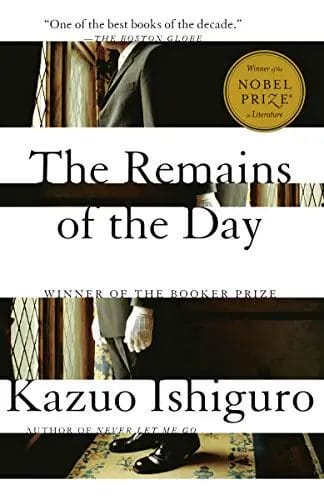

The Remains of the Day
The Remains of the Day is a profoundly compelling portrait of the perfect English butler and of his fading, insular world postwar England. At the end of his three decades of service at Darlington Hall, Stevens embarks on a country drive, during which he looks back over his career to reassure himself that he has served humanity by serving “a great gentleman.” But lurking in his memory are doubts about the true nature of Lord Darlington’s “greatness” and graver doubts about his own faith in the man he served.
A tragic, spiritual portrait of a perfect English butler and his reaction to his fading insular world in post-war England. A wonderful, wonderful book.
My thoughts:
Kazuo Ishiguro’s “Never Let Me Go” is one of my favorite books of all time. I devoured it in a day and then sat and wept for a while after finishing it. It ripped out my heart and changed me. Surprisingly enough, the movie is equally heartbreaking. I loved that book so much that I was afraid to read anything else by this author for fear of being let down.
“The Remains of the Day” has been hailed as one of this author’s best (if not his best), and I have had it on my TBR forever. I finally decided to give it a go, and while I can see why people loved it, it didn’t hit the emotional depth that “Never Let Me Go” hit for me.
This book is told through the eyes of Stevens, an English butler living in post-WWII England. The novel begins with Stevens receiving a letter from his former colleague, Miss Kenton. Her letter hints at an unhappy marriage, and Stevens, ever the devoted butler, considers visiting her. The current owner of the mansion that Stevens is the head butler of is an American man who is headed back to the States for a week. While he is gone, he encourages Stevens to go and see the English countryside, which would give Stevens a chance to reconnect with Miss Kenton, whom he hopes he can convince to come back and work as part of the staff.
As Stevens meanders along the country roads, the narrative is interspersed with flashbacks that reveal his unwavering loyalty to Lord Darlington – the previous owner of the estate. It becomes apparent that Lord Darlington was a Nazi sympathizer, and Stevens grapples with the implications of his own loyalty to such a man. Through poignant reflections, Stevens contemplates the meaning of dignity and the role of a great butler. These moments of introspection allow the reader to delve into the complexities of Stevens’ character and understand his motivations.
The true heart of the novel lies in the relationship between Stevens and Miss Kenton. Through their conversations, as recollected by Stevens, their deep connection is palpable despite having a love/hate relationship. It becomes evident that they had feelings for each other during their time working together in the 1930s and that Stevens may feel that Miss Kenton is the “one who got away”. However, they never fully acknowledged these feelings, and their relationship remained purely professional. Through this, Ishiguro explores themes of missed opportunities and the consequences of repressing one’s emotions.
I will admit that Ishiguro’s prose is exquisite and exudes a quiet elegance that perfectly matches the character of Stevens. Through his precise and introspective writing style, the reader is transported into Stevens’ mind, feeling the weight of his decisions and the pain of his unexpressed emotions. The narrative unfolds with melancholic beauty, and the story does hit an emotional chord but, for me, never quite hits the emotional depths of “Never Let Me Go.”
Probably the most poignant lesson comes when, in a chance encounter with a stranger, Stevens is reminded of the importance of living in the present. This stranger, who shares a similar background, advises Stevens to focus on the “remains of the day,” metaphorically alluding to the future and what is left. This encounter prompts Stevens to reassess his own life and the opportunities that lie ahead.
While I appreciated the story and the message – especially the reminder that we should cherish every last moment of every day – this one didn’t fully hit the mark that I hoped it would. It’s a good read and exquisitely written, and fans of literary fiction will love it. For me, I enjoyed it, but I didn’t love it.













